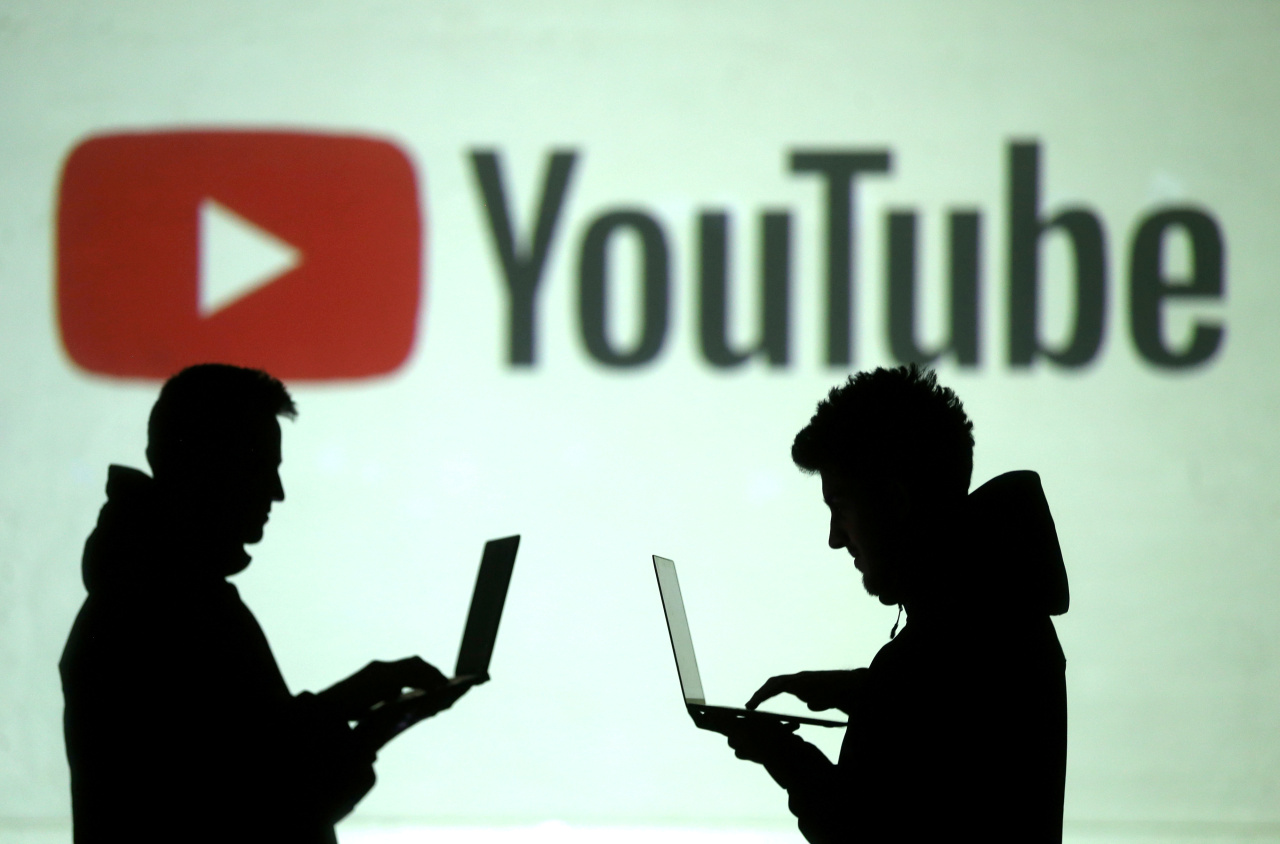 |
Silhouettes of mobile device users are seen next to a screen projection of YouTube logo (Reuters-Yonhap) |
In 2020, YouTube was a land of opportunity -- a place where a nobody could rise to fame and riches. As many people were forced to spend more time indoors in the year of COVID-19, it became not too difficult to find an acquaintance or two starting a YouTube channel, hoping to become the next YouTube sensation.
According to mobile data analytics firm IGAWorks, 83 percent of Koreans spend 29.5 hours on YouTube per month -- longer than Facebook and KakaoTalk combined. Sales of microphones and video cameras for internet broadcasting spiked this year, with classes and business meetings going online also playing a role. The number of YouTube channels making a profit through advertisements in Korea stands at over 97,000, compared to 56,359 channels last year, according to YouTube analytics Playboard.
The splendor of YouTube, however, also created a dark shadow in the form of controversies and troubles surrounding YouTubers.
The year began with popular Korean YouTuber “I’m Tourette” caught faking Tourette syndrome just a couple of days into the year. The YouTuber gained popularity and sympathy by showing the everyday life of a person with the disorder that involves repetitive movements or unwanted sounds, with a video showing him eating ramen going viral.
After one of his classmates revealed that the YouTuber’s name is actually Hong Jeong-ho and he had released a song as a rapper, Hong apologized and eventually closed down the channel with around 400,000 subscribers that made over $8,000 a month.
He has since returned to rapping and uploads videos to his YouTube channel with over 150,000 subscribers.
This was only the beginning to a year full of YouTuber troubles and controversies.
With the entire world fighting COVID-19, a Korean YouTuber caused an uproar in January in the early days of the novel coronavirus with prank videos showing himself pretending to be a person from Wuhan, China, in Busan with COVID-19. The YouTuber said the main motive was to become popular on the platform.
Police called him in for questioning and, after his release, the YouTuber continued to upload videos. Eventually, he was sentenced to 10 months in prison suspended for two years with 200 hours of community service in August.
Another YouTuber, Ryu Jung-ran exacerbated COVID-19 worries of the public by uploading a video of himself and others trespassing into a temporarily closed CGV theater in August without wearing masks. He not only sat in the theater, but also ate food from the concession area. The theater was closed due to one of its employees having tested positive for the virus. The YouTuber who once had 330,000 subscribers apologized, but the damage was done and CGV had to sanitize the entire facility. The cinema chain operator ultimately chose not to file for damages against the YouTuber.
The impact of YouTubers could also be seen this year through the troubles some caused to food and beverages businesses.
YouTuber Song Dae-ik caused an uproar in June when he pretended that his order of chicken and pizza from a fast food chain was delivered with someone already having taken a bite.
Another YouTuber, HayanTree with 690,000 subscribers, laid out a claim that an all-you-can-eat soy sauce-marinated crab restaurant had reused leftover food. He said he had found a grain of rice in the marinated crab. However, it was later shown that the rice had come from his own food.
Before he could apologize, the damage was done. Over 1 million people saw the video and the restaurant went out of business after a deluge of criticism.
The owner went on to write a petition on the Cheong Wa Dae website, demanding measures to prevent YouTubers’ abuse and tyranny.
 |
YouTube app logo (Reuters-Yonhap) |
As the YouTube market has grown, YouTubers attacking other YouTubers became common and controversy on the YouTube platform even led to a change in government policy.
In August, YouTubers Cham PD and Hong Sound, among others, criticized YouTube channels practicing backdoor advertising, or the act of hiding that products in the videos were sponsored for advertisements. The revelation followed well-known stylist Han Hye-yeon and singer Kang Min-kyung apologizing for backdoor advertising in July after a local media outlet reported on the practice.
Many YouTubers came forth and apologized for backdoor advertising after they were called out by others. In the end, a new guideline by the Fair Trade Commission took effect in September that requires online streamers to explicitly reveal business ties when advertising products.
YouTubers Kim Yong-ho and Jung Actor targeted instructors Rhee Keun and Logan of popular YouTube show “Fake Men” in October, resulting in all episodes of the series being pulled from YouTube and the cancellation of a planned TV show.
Closing out the year, when convicted child rapist Cho Doo-soon was released in December, many YouTubers rushed to Ansan, Gyeonggi Province, where Cho’s house was located. The flocking of YouTubers to Ansan angered residents whose properties were trespassed on by overly eager YouTubers. The residents were also anxious over the spread of COVD-19 with the influx of large crowds of outsiders. One YouTuber even damaged a vehicle -- which was government property -- escorting Cho to his house after he was released from prison. The mayor of Ansan requested that YouTube delete all videos regarding Cho.
Although 447,734 YouTube videos in Korea were deleted in the third quarter for violating the company’s guidelines, according to Google, the restriction of YouTube content that could be harmful to society remains a difficult task.
As YouTubers search for more provocative content to capture viewers, many petitions cropped up throughout the year on the Cheong Wa Dae website, demanding legislation to regulate YouTubers.
Under current law, though YouTubers can be punished for illegal actions, it is difficult to prohibit their pursuit of provocative, irresponsible content.
By Lim Jang-won (
ljw@heraldcorp.com)









![[Today’s K-pop] Blackpink’s Jennie, Lisa invited to Coachella as solo acts](http://res.heraldm.com/phpwas/restmb_idxmake.php?idx=644&simg=/content/image/2024/11/21/20241121050099_0.jpg)